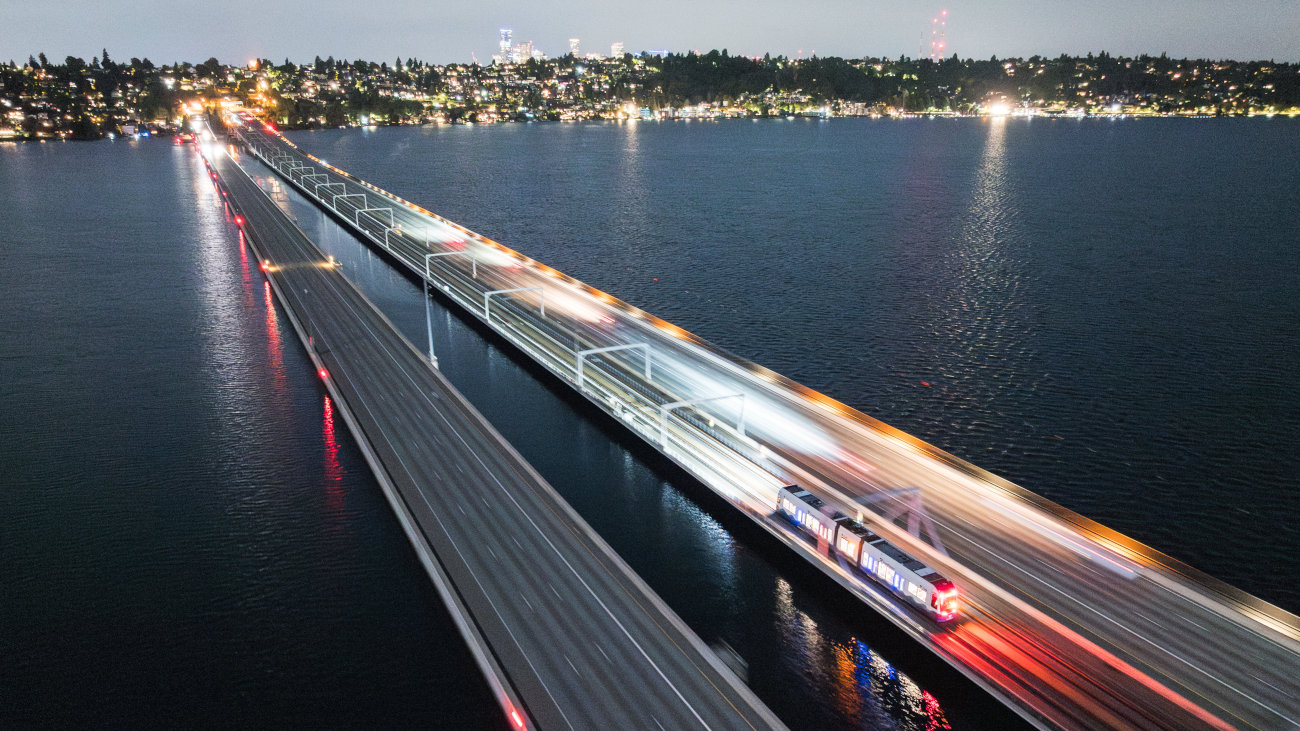
Technology drives creativity and quicker, more cost-effective projects. A step change for our industry.
See how we connect innovation to outcomes.

Expert insights on issues that transform business, increase sustainability and improve lives
Topics
Here’s a snapshot of what we’re thinking about. Explore these highlights or view the full library to dive deeper into the ideas shaping our work.

Meet some of our passionate problem-solvers, constructive creatives and inspiring innovators

Sound Transit LRV achieves world-first on Seattle’s floating bridge
A significant milestone was achieved on Sound Transit’s East Link Extension light rail project as, for the first time in history, a light rail vehicle (LRV) operated under its own power across the I-90 floating bridge. The LRV departed Mercer Island Station and traveled toward Seattle, drawing power from the overhead catenary system as it crossed Lake Washington.
The test was closely monitored by engineering teams overseeing traction power, catenary interaction, wheel-rail dynamics, and communication systems in real time. The LRV operated smoothly on its first attempt, validating the integration and performance of multiple systems working together under live conditions.

The Sound Transit LRV crosses the I-90 floating bridge (Photo courtesy of Sound Transit)
For more than seven years, Mott MacDonald has served as part of Sound Transit’s construction management consultant team, providing project management leadership, contract administration, and technical oversight. The team has been instrumental in coordinating complex systems integration – verifying traction power systems adapted to bridge movement, validating signaling and communications, assessing stray-current and cathodic-protection systems, and ensuring safe, reliable performance under dynamic bridge conditions.
“This milestone is more than an engineering success – it reflects the leadership, expertise, and innovation of our people, along with the persistence required to overcome challenges once thought impossible,” said Guil Pereira, Resident Engineer at Mott MacDonald.
The East Link Extension, part of Sound Transit’s system expansion program, will help meet the Puget Sound region’s rapid population and employment growth by providing faster, cleaner, and more reliable connections across Lake Washington. When it is completed in early 2026, the 2 Line will link Redmond, Bellevue, Mercer Island, and Seattle, enhancing mobility throughout the region.
- North America
- Rail
You might also be interested in

Wynton Habersham joins Mott MacDonald to lead rail systems market in North America
Wynton Habersham has joined Mott MacDonald as market leader for rail systems in the United States. In his role, he will lead the delivery of rail systems and train control professional services to clients in North America.

Metrolinx launches Line 6 Finch West Light Rail Transit
The new Line 6 Finch West LRT significantly improves connectivity for residents and commuters, easing congestion on major routes and providing thousands of daily riders with safe, reliable, and environmentally sustainable transportation.

Sound Transit’s Federal Way Link Extension opens for passenger service
The opening celebration kicked off with speeches from community leaders and a ribbon cutting ceremony in Federal Way, Washington, followed by a day of planned special events to commemorate the achievement.

Zero-Emission Multiple Unit (ZEMU) passenger rail project wins award for hydrogen safety excellence
The San Bernardino County Transportation Authority’s (SBCTA) Zero-Emission Multiple Unit (ZEMU) passenger rail project recently won the Center for Hydrogen Safety’s Robert Zalosh Hydrogen Safety Excellence Award in the project category.

A new Green Line Light Rail to South East Calgary
As Calgary prepares for a future where its population could double by 2076, the city is investing in infrastructure that meets both today’s needs and tomorrow’s possibilities.

Expanding Sound Transit’s light rail system to serve a growing Seattle
As Seattle prepares for significant population and job growth, the West Seattle and Ballard Link Extensions will add efficient light rail transit options to connect communities with reliable public transportation.

Los Angeles Regional Connector
We helped to deliver the Los Angeles Regional Connector, encouraging Angelenos towards public transport.

Linking up Silicon Valley
The world’s third-biggest bored tunnel is being built to close a gap in the Bay Area’s rapid transit system, with minimal disruption to residents and businesses.

Sound Transit's Federal Way Link Extension
The Federal Way Link Extension light rail project will bring much-needed transit services to the Seattle region.

Ontario Line, Toronto
Toronto’s largest and most complex transport project to date, the Ontario Line, is being delivered under a combination of two large public-private partnerships and two progressive design-build contracts.

Transforming rail on Manhattan's East Side
An unprecedented achievement that overcame a host of urban engineering challenges, the East Side Access megaproject provided a major expansion of commuter rail in New York.

